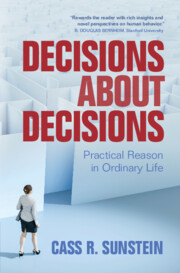Book contents
- Decisions about Decisions
- Decisions about Decisions
- Copyright page
- Contents
- Tables
- Preface
- 1 Second-Order Decisions
- 2 Deciding to Opt
- 3 Deciding to Know
- 4 Deciding to Believe, 1
- 5 Deciding to Believe, 2
- 6 Deciding Inconsistently
- 7 Deciding to Consume, 1
- 8 Deciding to Consume, 2
- 9 Deciding by Algorithm
- 10 Deciding for Oneself
- Epilogue “Get Drunk!”
- Acknowledgments
- Index
7 - Deciding to Consume, 1
In General
Published online by Cambridge University Press: 29 June 2023
- Decisions about Decisions
- Decisions about Decisions
- Copyright page
- Contents
- Tables
- Preface
- 1 Second-Order Decisions
- 2 Deciding to Opt
- 3 Deciding to Know
- 4 Deciding to Believe, 1
- 5 Deciding to Believe, 2
- 6 Deciding Inconsistently
- 7 Deciding to Consume, 1
- 8 Deciding to Consume, 2
- 9 Deciding by Algorithm
- 10 Deciding for Oneself
- Epilogue “Get Drunk!”
- Acknowledgments
- Index
Summary
Contrary to a common picture of relationships in a market economy, people often express communal and membership-seeking impulses via consumption choices, purchasing goods and services because other people are doing so as well. Shared identities are maintained and created in this way. Solidarity goods are goods whose value increases as the number of people enjoying them increases. Exclusivity goods are goods whose value decreases as the number of people enjoying them increases. Distinctions can be drawn among diverse value functions, capturing diverse relationships between the value of goods and the value of shared or unshared consumption. Though markets spontaneously produce solidarity goods, individuals sometimes have difficulty in producing such goods on their own, or in coordinating on choosing them. Here the law has a potential role. There are implications for trend setting, clubs, partnerships, national events, social cascades, and compliance without enforcement.
Information
- Type
- Chapter
- Information
- Decisions about DecisionsPractical Reason in Ordinary Life, pp. 123 - 143Publisher: Cambridge University PressPrint publication year: 2023
